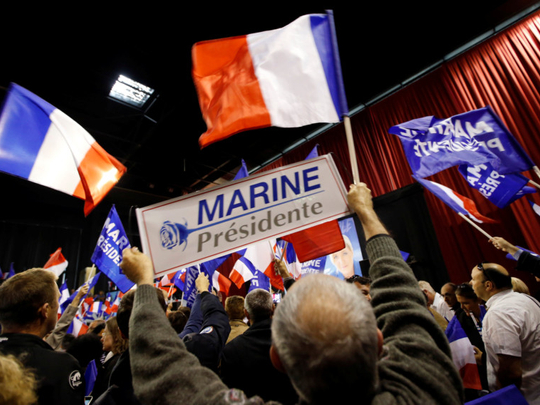
France goes to the polls on Sunday for the first round of a two-stage election which has become the country’s most uncertain presidential contest for a generation. Given the recent surge for left-wing veteran Jean-Luc Melenchon, who is backed by the Communist Party, the race has become a potential four-way contest.
Part of the reason why the outcome is so uncertain is that surveys — remarkably — suggest up to third of 45.7 million electorate might abstain given the current French angst about politics. Moreover, even amongst those who intend to vote, around one third are undecided between the eleven candidates, including the four major ones: Melenchon, National Front leader Marine Le Pen, centre-right Republican candidate Francois Fillon, and independent, centrist Emmanuel Macron.
Melenchon’s recent rise raises the outside prospect of a potential far left and extreme right stand-off between him and Le Pen in the second stage on May 7 (in which the two candidates with the largest votes from Sunday’s first round go head-to-head). Many would regard this as an apt finale for a contest that incumbent Francois Hollande says “smells bad” with “simplications and falsifications” marked by anti-establishment anger and populism.
With both Melenchon and Le Pen opposed to the euro single currency, and sceptical of the EU at large, this prospect has been described as a choice “between economic disaster and economic chaos” by Pierre Gattaz, head of the French business federation. If either candidate does emerge victorious in May, it could be a more savage blow for Brussels than Brexit given France’s Eurozone membership and the fact that — alongside Germany — the country has traditionally been the ‘twin-engine’ of EU integration.
Like Le Pen, Melenchon also favours withdrawing from Nato and warmer ties with Russia. As with the National Front candidate, part of this appears to derive from anti-Americanism and a view, to phrase Le Pen, that Nato exists to serve “Washington’s objectives in Europe”.
In what has been a hugely volatile election — which has seen Hollande (the least popular president since records began) deciding late last year not to seek re-election for a second term, the first incumbent not to do so since the Fifth Republic was created in 1958 — momentum has oscillated wildly. Firstly, there was a surge for Le Pen who still leads some polls; followed by the rise late last year of Fillon who has since been plagued by scandal; followed by momentum for Macron earlier this year; and now Melenchon’s rise.
Distrust of political class
A key reason for this fluctuation is distrust of the political class, but also a context of economic pain since at least the 2008/09 international financial crisis. The country has suffered years of double digit unemployment (currently 10 per cent) and low growth (only 1.4 per cent this year) driving discontent with the status quo.
Into this vacuum has most recently emerged Melenchon, the oldest major candidate at 65. After strong TV performances, Melenchon’s personal approval rating jumped over 20 percentage points in a month to around 70 per cent making him, currently, France’s most popular politician.
Melenchon, who resigned from the Socialists in 2008 to head up a grassroots movement — La France Insoumise (Untamed France) — has surged in some polls from fifth to third place ahead of Fillon, and is mainly picking up votes from the Socialist candidate Benoit Hamon. If his rapid rise continues in coming days, he could possibly come second or even first on Sunday.
Melenchon advocates a radical tax and spend platform, including boosting public spending by €175 billion (Dh682.3 billion) over five years; reducing France’s working week from 35 to 32 hours; lowering the retirement age to 60 with full pension; raising the minimum wage by 15 per cent plus social security benefits too; and taxing earnings of more than €400,000 a year at 100 per cent. He also wants to move away from nuclear power which produces about 75 per cent of the nation’s electricity.
Yet, given the unpredictability of the race it is still conceivable that any two of Le Pen, Fillon, Macron or Melenchon could get through to the run-off next month. In many recent polls, Le Pen and Macron lead the field, but Melenchon is surging and Fillon cannot be completely ruled out.
Meanwhile, Socialist candidate Hamon is trailing badly in fifth place underlining how shaken the ruling party currently is. Already some in the Socialist ranks are looking outside their party to Macron, who once served as economy minister in Hollande’s cabinet, as the best means to stop Le Pen and kill off the chances of Fillon.
Macron — who at 39 is the youngest major candidate in the field — is the favoured contender in many European capitals given his pro-EU, centrist credentials. He is pioneering a new political movement, En Marche! (Forward!), whose popularity this year reflects a vacuum of power in the political centre ground created by the scandals surrounding Fillon, and also Hamon’s lacklustre centre-left candidacy. Should Macron get through to the run-off election in May, some polls indicate he would win against any of the other major candidates and could therefore become the clear favourite.
However, what unites Macron’s candidacy with both Le Pen and Melenchon is the fact that none of them — as things stand — have a strong party apparatus in the lower house of the French National Assembly (which holds new elections in a few weeks time) to help drive their agenda through after May. Currently, Socialists and Republicans are preponderant in that legislature, raising the intriguing question of how successful any of the three could be as president if the balance of forces in the chamber remain dominated by these two established parties.
Taken overall, Sunday’s election outcome remains highly uncertain with all to play for in the final few days. While Macron and Le Pen are still front-runners according to polls, either Melenchon or Fillon could yet get through to May’s run-off.
Andrew Hammond is an Associate at LSE IDEAS at the London School of Economics.











